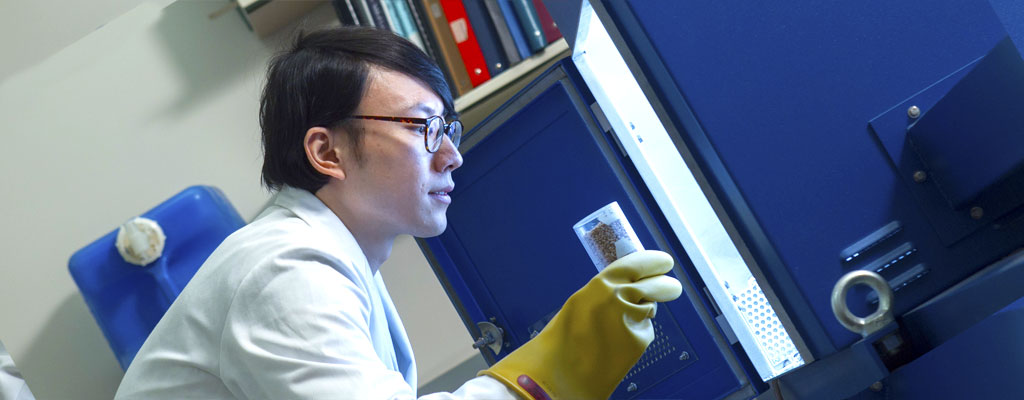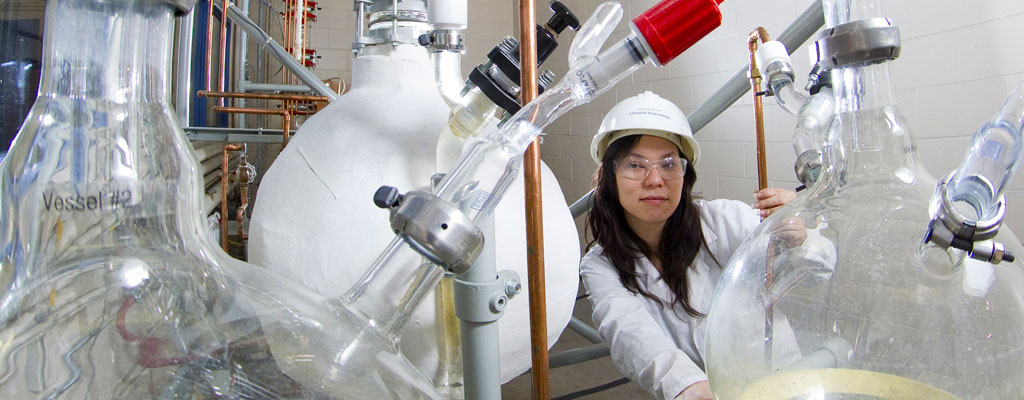About the Department
The Department of Chemical and Biological Engineering consists of 15 faculty (including one Canada Research Chair) and 4 technical staff members. Faculty are engaged in research in four major themes, namely, biotechnology and bioprocessing, energy and renewable resources, environment, and mineral processing and materials.
The primary objective of the department is to prepare students for careers as professional engineers. This is accomplished by offering a contemporary undergraduate program in Chemical Engineering that is duly accredited by the Canadian Engineering Accreditation Board. It is the department's goal that, following a suitable work period, students may register as Professional Engineers in any province in Canada. The department also offers graduate programs in Chemical and Biological Engineering at both M.Sc./M.Eng. and Ph.D levels.
We engage industry (manufacturing, agricultural and processing, consulting, natural resources, etc.) in our teaching and research programs. Research partners of the department come from within Saskatchewan, Canada, and all over the world. Our research is supported by highly qualified personnel (faculty, staff, undergraduate and graduate students, postdoctoral fellows, research engineers, etc.).
Undergraduate Programs
Graduate Programs
Biological Engineering

The Chemical and Biological Engineering Department offers Biological Engineering at the graduate level. MSc and PhD programs in Biological Engineering integrate engineering science with biological sciences for exploring interdisciplinary research in life sciences, agriculture, food processing and environment. The program has been designed to accommodate students and researchers with broad interests within the field of Biological Engineering.
Chemical Engineering

Chemical engineers design, implement and improve technology to make life more comfortable for humankind, while keeping public safety in mind. Chemical engineers manipulate chemicals on a large scale by designing and operating complex processes that convert raw materials into more useful products.
Information on our programs and the applications process can be found at the College of Graduate and Postdoctoral Studies (CGPS) website.
Biological Engineering: https://grad.usask.ca/programs/biological-engineering.php
Chemical Engineering: https://grad.usask.ca/programs/chemical-engineering.php
Please note that all programs require a supervisor, and that it is recommended that applicants secure a supervisor prior to beginning an application. Any questions can be sent to engrgrad.inquiries@usask.ca.
For more information, please see our FAQ page.
https://engineering.usask.ca/future-students/graduate-students/applying.phpSubmit an online application
Before beginning your online application, be sure that you have carefully reviewed all program information and admission requirements on this page. All of our programs require a supervisor, and it is recommended that applicants secure a supervisor prior to beginning an application.
During the application, you'll be asked for:
- Personal information such as your name, address, etc.
- Contact information of your three referees
- For your letters of recommendations, two of your referees must be academic contacts, and the third may be academic or professional
- Your complete academic history from all previous post-secondary institutions
The application takes about 30 minutes to complete. You may save your application and return to it later.
At the end of the application, you will need to pay a non-refundable application fee outlined below.
- $125 for domestic students
- $145 for international students
Your application will not be processed until payment is received.
Our People
Loading...
Research
A significant number of the research projects in the department involve industrial, government, community and other partners who provide funding, expertise, and access to special research facilities. Partner organizations are based in Saskatchewan, across Canada, and around the world. Faculty members are also active in professional associations, technical societies and editorial boards.
Faculty members pursue research in four broad areas within Chemical & Biological Engineering.
- Biomaterials Engineering
- Biomimetric and Bioinspired membranes
- Membrane Technology for Biomedical Applications
- Fermentation
- Food Quality / Control
- Torrefaction
- Fuel Cells
- Food Sterlization
- Biofuel
- Biosorption
- Bioremediation
- Value-added Processing of Agricultural Materials
- Post-Harvest Technology
Faculty: A. Abdelrasoul, S. Alam, O. Baik, A. Dalai, R. Evitts, Y. Lin, V. Meda, M. Nemati, C. Niu, L. Tabil
- Energy Conversion
- Water-energy Nexus
- Clean / Green Energy
- Catalysis
- Petroleum
- Sustainability Development
- Particulate System Handling
- Reaction Engineering
- Metal Recovery
- Thermodynamics of Green Process Mixtures
Faculty: A. Abdelrasoul, S. Alam, O. Baik, A. Dalai, R. Evitts, Y. Lin, V. Meda, M. Nemati, C. Niu, D. Peng, J. Soltan, L. Tabil, H. Wang, L. Zhang
- Water and Wastewater Treatment
- Environment Protection
- Environmental Catalysis
- Clean Energy
- Membrane Science and Technology
- Multiphase Flow Systems
- Biosorption of Biochemicals and Drug Delivery
Faculty: A. Abdelrasoul, S. Alam, A. Dalai, Y. Lin, V. Meda, M. Nemati, C. Niu, J. Soltan, H. Wang, L. Zhang
- Advanced Nanomaterials and Nanotechnology
- Advanced materials for Membrane Separations
- Hydrometallurgy
- Corrosion
- Atomic Effective Catalysis
- Materials Synthesis and Characterization
Faculty: A. Abdelrasoul, S. Alam, A. Dalai, R. Evitts, H. Wang
Safety
Each member of the Chemical and Biological Engineering Department is a member of the safety team; this includes all employees as well as post-doctoral fellows, graduate and undergraduate students associated with the department. Primary responsibility is placed on the individual doing the work. For example, the student, the staff member, or the researcher is responsible for carrying out her/his work safely.
The Department Head appoints members of the committee in the department. Other members of the Departmental Safety Committee will be assigned yearly and the list of names distributed. The committee is responsible for:
- Establishing departmental safety policy.
- Promoting uniform safety practices and supervision of demonstrations of safety equipment available in the department.
- Fostering good communication in safety.
- Reviewing the department’s safety program.
- Reviewing the department’s accident experience.
- Reviewing projects from a safety viewpoint as required.
- Conducting departmental safety inspections at intervals.
- Assessing department’s safety protection equipment.
- Formulating the annual safety budget.
- Receiving accident reports.
- Maintaining a library of safety publications and safety data applicable to the department’s activities.
- Circulating safety information as required within the department.
- Consultation with the Occupational Health and Safety Committee on matters pertaining to safety.
- Reporting serious matters regarding safety or safe practices to the Occupational Health and Safety Committee.
The strength of the department’s safety program depends on the performance of its teaching assistants in the undergraduate instructional laboratories. By her/his actions and example, the teaching assistant develops students with safe working habits. By so doing, he/she strengthens her/his own safe working habits and becomes aware of the hazards of the chemistry laboratory. These habits carry over to her/his graduate research work. A few guidelines regarding the Teaching Assistant’s duties with respect to safety are:
- Teach and enforce safety as an integral part of the course. Ensure that students carefully analyze the safety aspects of an experiment prior to beginning. Such an assessment includes:
- Collecting pertinent information, forecasting potential hazards, selection of safe techniques, use of protective equipment
- Plan of action in case an unanticipated accident occurs
- In case of an accident or illness:
- Render prompt first aid, doing only the minimum necesary to prevent more serious injuries. If the injury or illness appears serious, have someone call for an ambulance (9-911 or 911 from a cell phone).
- Report all accidents that cause injury, no matter how minor, immediately to your supervisor and the Department Safety Chair, so that an Accident Report can be completed.
Should a spill/accident occur, it is the duty of the person involved to see that the area is cleaned up as soon as possible, using the proper safety precautions. Should that person be incapacitated due to the accident, no one should begin the clean up until the proper procedure is known and the necessary safety equipment is available.
All graduate students, post-doctoral fellows, and research personnel who have finished their program are required to clean their lab and desk area prior to departure. They must properly store or dispose of all chemicals. It is the responsibility of the supervisor to see that this procedure is carried out.
Regular safety inspections are conducted throughout the year. Supervisors are responsible for safety in their area and should ensure that students and other personnel maintain a safe environment.
All employees must have some form of training in the area of Health and Safety. The following key courses are available from Safety Resources.
- a) Laboratory Safety – compulsory for all employees working in the laboratories (staff, students, faculty).
- b) WHMIS – compulsory for all employees working in the laboratories (staff, students, faculty).
- c) Safety Orientation for Employees – compulsory for all new staff and faculty.
Please see the list of Safety Training courses for more information.
ChESS
Chemical Engineering Student Society
What do we do? Our representatives facilitate social outings, conduct tutorials and organize graduation ceremonies for students who convocate in the spring.
Our Mission: ChESS was formed with the purpose to build relationships and foster a community within the Department of Chemical Engineering.
How can I participate in events or get involved with ChESS?
You can contact us by email at: chess.president@sess.usask.ca
Check out our facebook page for information on events going on within the college: www.facebook.com/groups/869774483151902/
For even more updates follow us on Instagram at: www.instagram.com/usask_chess/
Elections are held every April for the oncoming year.
CBE Women in Engineering
We support and empower female engineering students in the Department of Chemical and Biological Engineering.
Visit the Women in Engineering: Chemical and Biological Engineering webpage.
Contact Us
Loading...

